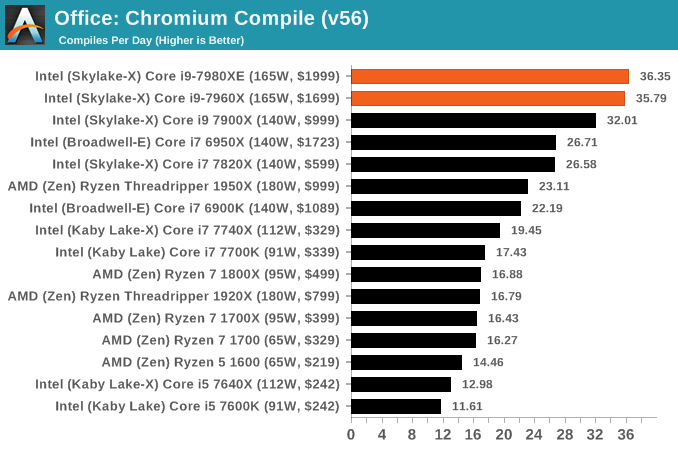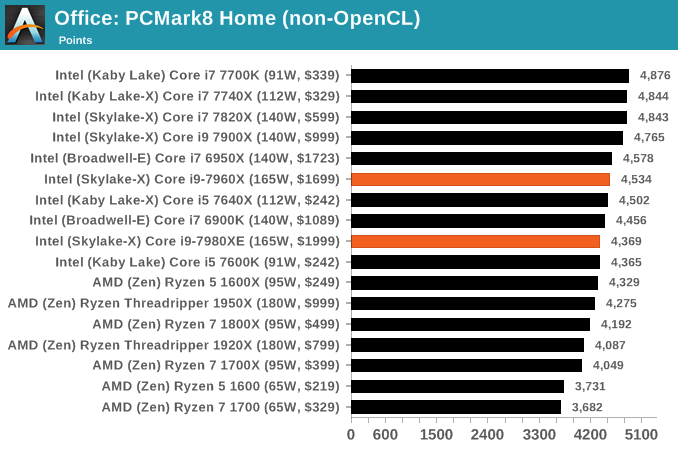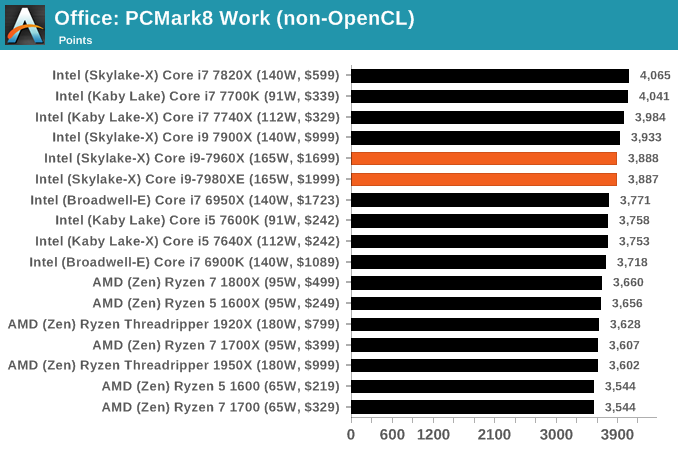The Intel Core i9-7980XE and Core i9-7960X CPU Review Part 1: Workstation
by Ian Cutress on September 25, 2017 3:01 AM ESTBenchmarking Performance: CPU Office Tests
The office programs we use for benchmarking aren't specific programs per-se, but industry standard tests that hold weight with professionals. The goal of these tests is to use an array of software and techniques that a typical office user might encounter, such as video conferencing, document editing, architectural modelling, and so on and so forth.
All of our benchmark results can also be found in our benchmark engine, Bench.
Chromium Compile (v56)
Our new compilation test uses Windows 10 Pro, VS Community 2015.3 with the Win10 SDK to combile a nightly build of Chromium. We've fixed the test for a build in late March 2017, and we run a fresh full compile in our test. Compilation is the typical example given of a variable threaded workload - some of the compile and linking is linear, whereas other parts are multithreaded.

PCMark8: link
Despite originally coming out in 2008/2009, Futuremark has maintained PCMark8 to remain relevant in 2017. On the scale of complicated tasks, PCMark focuses more on the low-to-mid range of professional workloads, making it a good indicator for what people consider 'office' work. We run the benchmark from the commandline in 'conventional' mode, meaning C++ over OpenCL, to remove the graphics card from the equation and focus purely on the CPU. PCMark8 offers Home, Work and Creative workloads, with some software tests shared and others unique to each benchmark set.












152 Comments
View All Comments
Reflex - Monday, September 25, 2017 - link
I'd ask you to post your credentials, but seriously your statements long ago precluded you from being anyone either in the industries you are opinionated about, or with the education to question anyone in those industries.Notmyusualid - Tuesday, September 26, 2017 - link
@ ReflexAaaand... check mate.
Well done.
vgray35@hotmail.com - Monday, September 25, 2017 - link
And did you notice that Big Blue has actually lost its marbles and its neurons are misfiring? Both the Core i9-7980XE and the Core i9-7960X have a TDP rating of 165W. However while the latter meets this TDP, the TCore i9-7980XE draws 190W at full load. That is a big no thanks also, when you consider 165W coolers are likely to be installed on the basis of the 165W TDP rating. We haven't even started over clocking yet, and it is likely this CPU will draw in excess of 350W, and one can only pray that thermal paste under the lid will play nice. Or did they really do something different this time around?ddriver - Monday, September 25, 2017 - link
Those are intel lies. Totally justified, because intel is rich. Not only are intel lies not bad, they are actually good. It makes you more intelligent if you believe in them. Only very intelligent people can get it.ddriver - Monday, September 25, 2017 - link
Curiously, no word of intel's AMAZING DUAL CORE HEDT i3-7360X here at AT. Lagging behind the cutting edge here :)Now that's a real game changer for intel. Although I wish they could launch a single core HEDT processor too. That's really where their portfolio is left gaping.
artk2219 - Monday, September 25, 2017 - link
Big blue is IBM BTW, intel is just intel, or if you want to call them anything else, go with "money grubbing, cheating, anti competitive, bastards who will screw everyone over for a buck in a heart beat". For short.vgray35@hotmail.com - Tuesday, September 26, 2017 - link
Sorry I meant to say Big Blue IIAndrewJacksonZA - Tuesday, September 26, 2017 - link
Or, you know, "Chipzilla."Just sayin'.
artk2219 - Friday, September 29, 2017 - link
Lol, chipzilla would also workdamianrobertjones - Saturday, September 30, 2017 - link
I've created countless videos, processed a lot of documents, but have never, ever, lost anything due to using standard non-ecc ram. Sure, in work, ALL of the servers use ecc but there's not even one standard desktop with the stuff. STILL no data loss. 32Gb at home and 64Gb in work.Yes, okay, I understand that ECC is for x and y, but is it 'really', REALLY, that important?